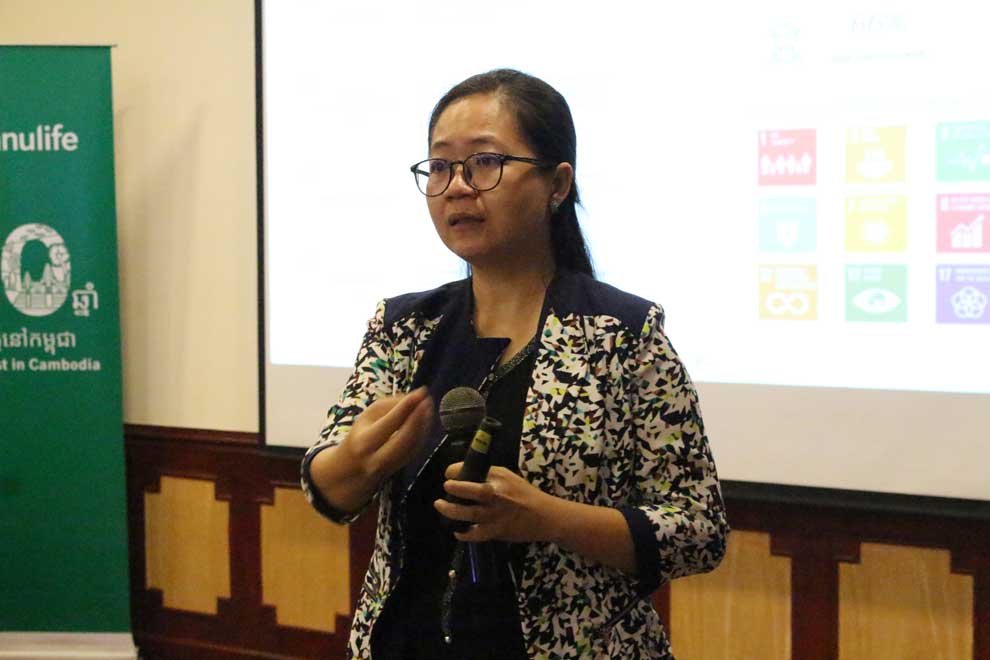
Incofin deputy regional director Chea Vuthy. PHOTO SUPPLIED
The Cambodian banking sector remains strong and not at significant risk of collapse, despite the occasional incidence of foreign investors pulling back after being spooked by “negative” news stories, according to Belgium-based global impact fund Incofin Investment Management Comm VA.
The position of the Kingdom’s broader financial sector has come into question amid the unfolding global banking crisis – said to have started with the collapse of Silicon Valley Bank (SVB) and Signature Bank in the US last month – that has shaken the entire financial world.
Incofin opened an office in Cambodia in 2013 and invests in Cambodian agricultural firms and microfinance institutions (MFI) through loans. The fund has reportedly raised about $100 million to invest in the Kingdom.
In a recent presentation to the media, Incofin deputy regional director Chea Vuthy commented that easily-accessible “negative” press reports, either on social media or in reputable newspapers, can make handling investment inquiries more challenging, and hence turn raising foreign capital to invest in the Kingdom into a more difficult endeavour.
“They [investors] aren’t afraid that Cambodians lack the ability to repay, to be honest, because the financial statements of Cambodian banks are strong. NBC [National Bank of Cambodia] reports also show that each bank has a large amount of capital and properly meets the central bank’s principles,” she claimed.
Although the total volume of financial activity is “strong”, a sudden glimpse of “negative” news linked to investment funds could worry existing or potential players. “They’ll ask what happened – even if it’s a small issue, we can’t afford to overlook anything”, she said, highlighting how attentive foreign investors can be.
Offering an example of such “negative” news coverage, Vuthy brought up research reports by civil society centring on certain borrowers from MFIs or rural credit institutions that are unable to repay their loans.
Focusing on such a “small corner of the negative” in the financial sector will lead to even more cautiousness in the market, Vuthy said, although she did acknowledge that considerable hardships do confront some of the millions of borrowers in Cambodia.
Industry insiders have made similar assurances that the Cambodian financial sector will remain largely unscathed by fallout from the demise of SVB and Signature Bank.
On March 16, Prime Minister Hun Sen urged the public not to panic-withdraw funds from their bank accounts, contending that the fall of the two major US lenders does not pose a significant risk of contagion in the Cambodian banking system.
“We call on the people to place their trust in [regulators’] abilities to manage the Cambodian banking and financial sector – banks have enough reserves to resolve any issues,” the premier stressed.
Although the 1997 Asian financial crisis caused some chaos among Cambodian banks, the adverse effects of the 2008 global financial crisis were minimal in the Kingdom, which at the time raised the reserve requirement ratio (RRR) from seven to 12 per cent to prevent more damaging consequences, he recapped.
RRRs are central bank regulations that set a minimum amount of cash which financial institutions must hold in reserve. The Cambodian RRRs for foreign and domestic currency deposits currently stand at 12.5 per cent and eight per cent, respectively, according to the NBC’s website.
The NBC also maintains minimum paid-up capital requirements for financial operators as thus: commercial banks and foreign bank subsidiaries ($75 million), foreign investment bank branches ($50 million), specialised banks ($15 million), microfinance deposit-taking institutions – or MDI ($30 million), and non-deposit-taking MFIs ($1.5 million).
In its 2022 annual report, the NBC indicated that Cambodia’s formal “banking” system comprised 59 commercial banks; nine specialised banks; five MDIs; 82 non-deposit-taking MFIs; 224 rural credit institutions; 16 financial leasing companies; five third-party processors; 34 payment service providers; one credit information sharing service provider; six foreign bank representative offices; and 2,869 money exchange businesses.
For reference, the Kingdom’s five MDIs were: Amret Plc, AMK Microfinance Institution Plc, PRASAC Microfinance Institution Plc, LOLC (Cambodia) Plc, and Mohanokor Microfinance Institution Plc.







